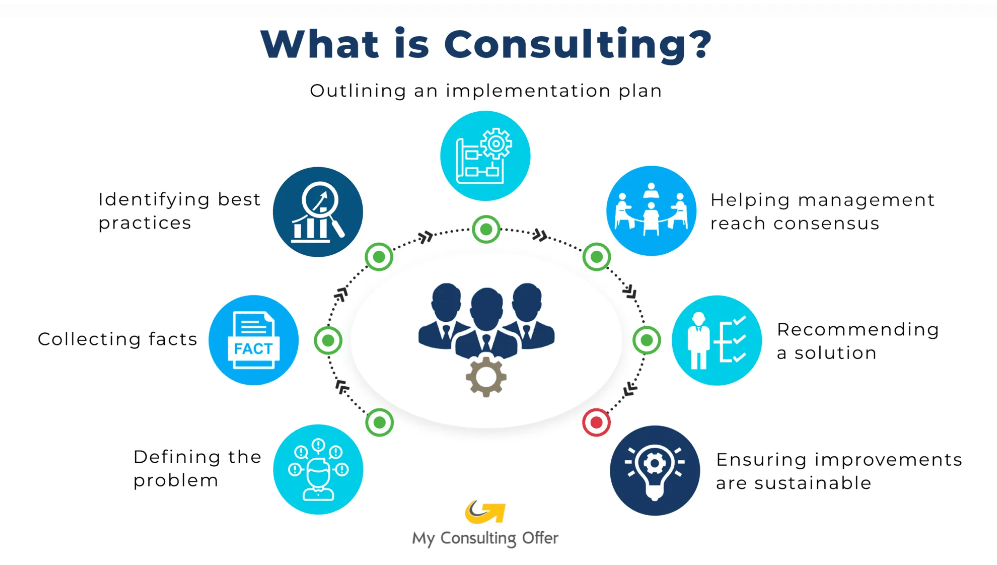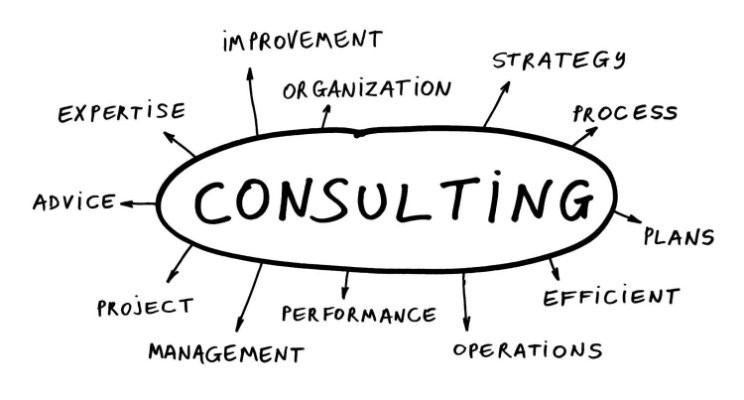Consulting may be your ideal career path if you are passionate about solving problems, designing strategies and have an innate ability to communicate effectively. It’s a profession that enables you to work closely with various businesses, helping them to identify their weaknesses, understand their markets, and improve their overall performance. Yet, it’s important to consider that the consulting sector demands a high-level of commitment, flexibility, and resilience. Long hours, frequent travel, and high-pressure situations are quite common in this field. It’s a career that will constantly challenge you, as every client and every project will be unique, requiring a tailored approach and solution.
Additionally, the field of consulting is highly competitive, with numerous talented individuals vying for limited positions in top-tier firms. However, if you thrive in dynamic environments and find satisfaction in helping businesses improve and grow, consulting may be the ideal career path for you. This path also offers a steep learning curve, providing opportunities to expand your knowledge across various industries and business functions. You can develop a diverse skill set, ranging from analytical thinking to project management.
Consulting also provides a platform to build a vast professional network, which can be beneficial for future career opportunities. It’s a career that can be highly rewarding, given the positive impact your work can have on a client’s business. However, it’s also a career that requires patience, as results are not always immediate and it may take time to see the fruits of your labor. The decision to pursue a career in consulting should not be taken lightly. It’s important to thoroughly research and understand what the job entails, the skills required, and the lifestyle it entails. Ultimately, determining whether consulting is your ideal career path hinges on whether it aligns with your personal and professional goals, skills, and interests.

Understanding the Role of a Consultant
A consultant is a professional who provides expert advice in a specific area of expertise such as management, education, healthcare, human resources, marketing, and others. Understanding the role of a consultant involves recognizing that they are hired to help businesses identify problems, and provide solutions to improve efficiency and profitability. They are often brought in to provide a fresh perspective and innovative strategies that might be overlooked by internal staff due to a lack of specialized knowledge or objectivity.
The role of a consultant is not limited to identifying issues; they also play a crucial role in implementing solutions and ensuring that the changes made are beneficial to the business. In essence, consultants act as catalysts for change by providing guidance, reducing risks, and facilitating decision-making based on their knowledge and expertise. This can include reshaping company strategies, introducing new technologies, or transforming company culture.
However, it is crucial to remember that the success of a consulting project largely depends on the collaboration between the consultant and the client. The best consultants are those who not only have a deep understanding of their field, but also possess excellent interpersonal skills to effectively communicate their ideas and foster a productive working relationship with their clients. Therefore, a consultant’s role is multifaceted, encompassing problem-solving, strategic planning, training, and even change management. With an increasingly competitive business environment, the demand for consultants is likely to keep growing as companies seek expert advice to stay ahead.
Key Skills and Qualities Needed for Success in Consulting
Success in consulting requires a unique blend of key skills and qualities. Primarily, exceptional problem-solving skills are crucial as consultants are often hired to tackle complex business issues. In addition, analytical skills are vital for understanding, interpreting, and utilizing data to inform business decisions. Excellent communication abilities are also paramount, as consultants need to effectively articulate their findings, recommendations, and strategies to clients of varying levels of understanding and backgrounds. Not only should a consultant be able to communicate clearly, but they should also be skilled listeners, as understanding client needs and concerns are essential to creating effective solutions.
Furthermore, creativity is a key quality for consultants, as traditional solutions may not always be the best fit for unique business challenges. A successful consultant should also have strong leadership skills and the ability to manage projects efficiently. This includes multitasking, meeting deadlines, and leading teams. It’s also crucial to have a deep understanding of industry trends, allowing consultants to provide the best advice and stay ahead in the competitive market.
Another essential quality is being adaptable and flexible. Consultants often have to work in various environments, deal with different personalities, and adjust their strategies to suit changing situations. This requires a high degree of resilience and stress management skills. Emotional intelligence is another critical quality for consultants. The ability to empathize with clients, manage their own emotions, and navigate interpersonal relationships effectively can greatly enhance a consultant’s success.
Lastly, integrity is a vital trait for consultants. They should uphold the highest ethical standards and be transparent with their clients, as this fosters trust and long-term relationships. In the fiercely competitive consulting industry, possessing these key skills and qualities can greatly enhance an individual’s chances of success.

Pros and Cons of a Consulting Career
A consulting career offers numerous benefits, including the opportunity to work on varied projects, continually learn and develop new skills, and engage with a diverse range of clients. It’s a career path that often provides a high level of autonomy, as consultants are typically hired to bring their unique expertise and perspectives to solve complex problems. The flexibility and variety inherent in consulting can make it a highly stimulating and rewarding career. Furthermore, it can be financially lucrative, especially for those who specialize in high-demand sectors.
However, a consulting career also has its drawbacks. The nature of the job can be highly stressful, as there is often pressure to deliver results within tight timeframes. The workload can also be unpredictable, with periods of intense activity followed by times of relative inactivity. This unpredictability can make work-life balance a challenge for many consultants. Travel is often a significant part of the job, which can be exciting for some but exhausting and disruptive for others, particularly those with families. Furthermore, the competitive nature of the consulting industry can mean that job security is less certain, particularly during tough economic times.
In conclusion, a consulting career offers the potential for significant rewards, both in terms of professional growth and financial compensation. However, it also presents challenges, including high stress levels, an unpredictable workload, extensive travel, and potential job insecurity. As such, it’s critical for individuals considering a career in consulting to carefully weigh these pros and cons to determine if this career path is the right fit for them.
Navigating Different Types of Consulting Fields
Consulting is a vast field that encompasses a variety of expert areas, each offering a unique set of challenges and opportunities. Business consulting, for instance, focuses on improving organizational performance, implementing new strategies, and solving specific problems within a company. In contrast, IT consulting is all about optimizing technological infrastructure, implementing new systems, or bolstering cybersecurity measures. Then there are more specialized forms of consulting, such as management consulting, which works to streamline managerial practices and improve overall business structure, and environmental consulting, which helps organizations comply with environmental regulations and adopt sustainable practices.
A successful consultant is not only an expert in their particular field but also possesses excellent problem-solving abilities, superior communication skills, and a knack for building strong client relationships. They need to understand their clients’ needs and provide tailored solutions, whether it is in the realm of finance, HR, marketing, or any other field. Therefore, navigating different types of consulting fields requires a flexible approach and a broad range of knowledge. One has to be adept at identifying the unique demands of each field and cater to them effectively.
Moreover, the consulting world is dynamic, and professionals need to keep up with the latest trends and developments in their respective fields. This could mean staying updated with the newest technologies in IT consulting, the latest marketing strategies in marketing consulting, or the most recent financial regulations in financial consulting.
In conclusion, consulting fields are diverse and complex, each with its own set of intricacies and demands. Regardless of the specific field, success in consulting requires a blend of industry-specific knowledge, problem-solving prowess, and the ability to adapt and learn. It’s a challenging yet rewarding profession that can make a significant impact on an organization’s success.

Steps to Launching a Successful Consulting Career
Starting a successful consulting career requires a series of thought-out steps to ensure effectiveness in the industry. The first step is to gain a solid foundation in your area of expertise. This could be achieved through formal education, professional experience or a combination of both. This is crucial as clients will rely on your knowledge and expertise to solve their problems or improve their operations. The second step is to acquire relevant certifications in your field. These certifications not only validate your skills but also set you apart from competition.
After getting a solid background in your field, the next step is to develop a comprehensive business plan. This plan should outline your target market, pricing strategy, marketing and sales strategies among other things. You should also define the unique value proposition that you will offer to your clients.
Next, you should focus on honing your soft skills. As a consultant, you will need to communicate complex information in a clear and concise manner. You will also need to be a good listener in order to understand your clients’ problems and provide tailored solutions.
Another critical step is to build a strong network. This can be done through attending industry events, joining professional associations and leveraging social media platforms like LinkedIn. Networking can help you to find potential clients, learn about new developments in your field and gain insights from other successful consultants.
Lastly, you need to continuously learn and adapt. The business world is dynamic and as a consultant, you need to stay updated on the latest trends, developments and best practices in your field. This will ensure that you are always offering the best possible solutions to your clients.
In conclusion, launching a successful consulting career is not a walk in the park. It requires a combination of technical knowledge, soft skills, business acumen, networking, and continuous learning. However, with dedication, perseverance and the right strategies, it is possible to build a prosperous consulting career.
